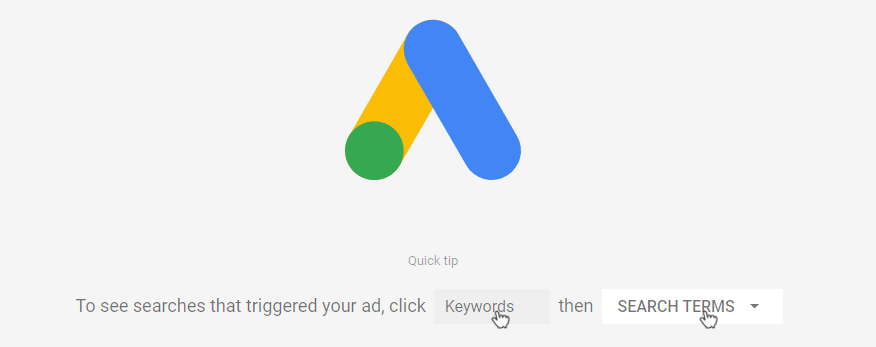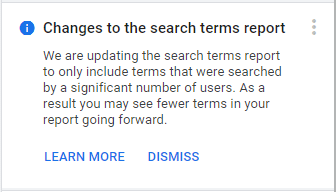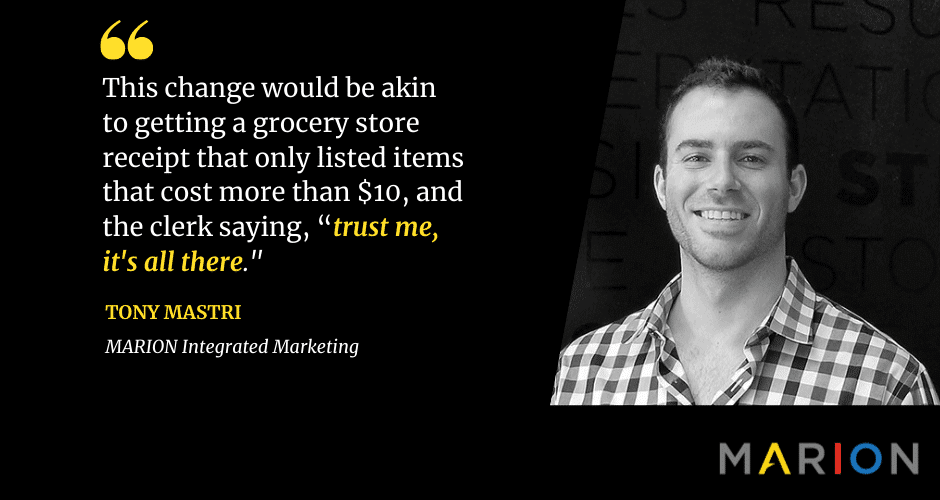As a paying customer in any situation, you like to know what you’re getting. Unfortunately, an upcoming change to Google Ads that limits advertiser access to search term data will be breaking that unspoken contract under the guise of “privacy.”
But first, let’s make sure you understand what search terms are within Google Ads, and why this change has marketers up in arms.
What Are Search Terms in Google Ads?
Search terms are the exact searches that Google users conduct that result in your ad being clicked. For example, if you’re running ads for marketing services, a Google user might use the search term “marketing services near me,” and then click on your result in Google Ads.
As an advertiser, Google recommends that you “Use the search terms report to see how your ads performed when triggered by actual searches within the Search Network. Identify new search terms with high potential, or see how closely actual searches are related to your selected keywords.”
Search Terms vs. Keywords
In the Google Ads platform, keywords and search terms are different entities. A keyword is essentially a rule for where you’d like your ads to appear within Google Search. Keyword match types include:
- Broad Match
- Phrase Match
- Exact Match
MARION provides pay-per-click in Houston, Austin, DFW, and everyplace in between, so we understand the subtleties of keyword match types in Google Ads. In the three sections below, we’ll identify three keyword match types, and examples of search terms (shown as bullet points) that fit into each type.
Broad Match
In a broad match keyword, any one of the words in your keyword phrase can be used in any possible order. Individual words can even be replaced by “equivalent” words as Google desires. As an example, if you were to use ‘marketing services’ as a broad match keyword in Google Ads, your ad could be served to users using the following search terms:
- Services for marketing
- Marketing best practices for services providers
- Advertising services
- Marketing services near me
Phrase Match
Phrase match keywords can include additional terms before and after your keyword, but they cannot be injected between your specified keywords. Examples of search terms that could occur under a phrase match keyword for “marketing services” include:
- Best marketing services
- What are marketing services
- Marketing services near me
Exact Match
Traditionally, and exact match keyword was only shown when a user’s search term exactly matched your keyword. In 2018, Google broadened the flexibility of exact match keywords by allowing their system to “Match the intent of a search with close variants.”
Keeping these changes in mind, examples of search terms that fall under the exact match keyword type for “marketing services” might include:
- Marketing services
- Marketing service
- Services for marketing
Search Terms Report in Google Ads Is Being Limited
As of September 2020, Google has been giving the following notification to advertisers within their Google Ads accounts, “We are updating the search terms report to only include terms that were searched by a significant number of users. As a result, you may see fewer terms in your report going forward.”
What does this mean for advertisers that use Google Ads?
Collin Slattery gave a great case study breakdown on Twitter of how hiding Google search term traffic data could impact an advertiser with a $120,000 budget over six months.
The $120k budget was spread across 26,000 search terms, and 44% of the budget was allocated toward search terms with 5 clicks or less. 30% of the total budget was spent on search terms with a single click.
This makes it incredibly important to understand what Google’s new policy means when it says it will only include, “terms that were searched by a significant number of users.” If “significant” means search terms that are clicked more than five times, PPC advertisers may end up losing data for around 44% of the search terms for which their budget is being used.
This change would be akin to getting a grocery store receipt that only listed items that cost more than $10, and the clerk saying, “trust me, it’s all there.” A significant portion of what you paid for would remain a mystery despite paying for the privilege to take those items home.
Recapping the Purpose of the Search Terms Report
As a reminder, Google’s own description of the search terms report recommends that you, “Use the search terms report to see how your ads performed when triggered by actual searches within the Search Network. Identify new search terms with high potential, or see how closely actual searches are related to your selected keywords.” If a significant portion of this data is hidden, the following may occur.
- You will be less effective at seeing “how your ads performed when triggered by actual searches.”
- You won’t be able to identify as many “new search terms with high potential.”
- You won’t be able to “see how closely actual searches are related to your selected keywords.”
Several developments to Google Ads over the past years have moved the platform toward acting as more of a black box. This had led to less and less data about how your ad budget is being spent while spending it all the same.
Efforts to Prevent the Hiding of Data in the Google Ads Search Query Report
A team of marketers has recently taken to Change.org to start a petition to prevent Google ads from hiding data about search term popularity within advertiser accounts. For advertisers that like to know what they’re spending their money on, signing the petition might interest you.
MARION Can Help with Your Pay-per-Click Campaigns
MARION keeps a finger on the changing Google Ads landscape so that you don’t have to. We have years of experience with PPC in Austin, Houston, and DFW, and are eager to help your business get results!
Contact our team today for more information about how our digital marketing agency can help grow your business!



